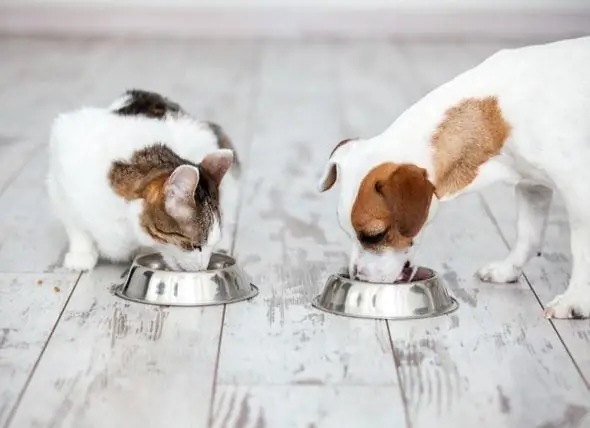
- Autors Daisy Haig haig@petsoundness.com.
- Public 2023-12-17 03:11.
- Pēdējoreiz modificēts 2025-01-24 12:39.
Pērkot kucēnu, jūs pērkat “veselības sertifikātu”, kas paredzēts līdzi. Tāpat kā jebkurš burtiski domājošs patērētājs, jūs pieņemat, ka sertifikāts ar šo nosaukumu nozīmē, ka viņu ir pārbaudījis veterinārārsts un viņa ir saņēmusi apstiprinājuma zīmogu veselības nodaļā.
Uzminiet vēlreiz.
Pagājušajā nedēļā es izsūtīju daudz e-pastu no savas FVMA (Floridas Veterinārmedicīnas asociācijas) saraksta-kalpošanas. Tēma bija plaši izplatītā profesionālā neskaidrība par OCVI (oficiāls veterinārā inspekcijas sertifikāts par suņa vai kaķa intrastātu tirdzniecību). OCVI, veidlapa, kuras nosaukums ir “veselības sertifikāts”, ir viens no tiem dokumentiem, ko lielākā daļa valstu pieprasa aizpildīt licencēts veterinārārsts, pirms dzīvnieku var pārdot vai pārvadāt pāri valsts līnijām.
the point of this document? to ensure animals are vaccinated and free of parasites or other infectious diseases before sale, not (contrary to popular opinion, including mine before last week) to certify the animal’s complete health.
(at least that’s how it stands in the great state of florida, given the confusion that reigns over what these documents actually mean and how ocvis are to be filled out.)
i wasn’t sure i believed this. after all, it has always seemed to me that the purpose of this form was to ensure that unscrupulous breeders and pet shops couldn’t pass on clearly defective “merchandise.” even if you could care less about animal health and welfare, it makes sense that a health certificate should certify health at the time the animal is examined-in the interest of consumer protection, at the very least.
the emails on this thread proved otherwise. indeed, several veterinarians spoke out against the ocvi as a proof of health, referencing the need to avoid legal liability in the event that a purchased pet prove chronically ill or congenitally flawed.
silly me, i thought that was the point. since we get paid to sign these documents i figured the financial remuneration was in exchange for our expertise-that is, beyond pushing a few shots, checking for kennel cough and expertly scooping stool from a rectum for analysis.
wrong!
confused, i researched this issue. and here’s what i found:
apparently, the problem of “health certification” and veterinarian resistance to the issue stems from a drive to make vets liable for congenital illnesses that manifest up to a year after purchase when they sign ocvis.
example: a pup that was normal when a vet examined him at 8 weeks. six months later he’s diagnosed with hip dysplasia. and guess what? according to this proposed interpretation of ocvis the vet is potentially liable for his treatment.
given the choice between a document that makes me liable for what i can attest to and one that requires a crystal ball for the kind of accuracy i’m willing to sign my name to, i guess i’ll elect the former any day of the week. can’t blame my fvma colleagues on that score.
but why the either/or? why can’t i simply be liable for all the problems any reasonable vet should have seen at the time the exam?
honking heart murmurs, undescended testicles, certain obvious knee and hip diseases…
don’t these congenital niceties deserve to be included among the “health” issues we need to vet as vets?
i see pet shop pups and other shipped pets with two day-old ocvis bearing obvious congenital illnesses any third-year vet student could diagnose. clearly that’s wrong. someone needs to be accountable when these conditions are given a pass. but legally, all’s fair and square if a health certificate only deals in infectious diseases. after all, most states also have pet lemon laws making it “easy” to return a defective afflicted animal within a certain period of time. no harm no foul, right?
wrong again. no animal should be sold without a veterinarian’s stamp of approval within ten days of the sale. and that should mean that the animal appears to be completely healthy at the time of the exam. any congenital abnormalities should be written on the form. anything less means no sale. no way.
responsible breeders wouldn’t dream of doing otherwise. pet shops, on the other hand, exploit all the angles. they work with vets who know the loopholes as well as they do. they even try to get prospective owners to sign lemon law waivers, passing them off easily in the pile of paperwork that attends the point of sale.
as it stands, what you consider a health certificate for that puppy in the window may mean nothing except that said pup was vaccinated, no upper respiratory symptoms were noted and that no parasites were observed on the day the pup was presented to the vet for examination. but if vets are liable for only those meager, easily refutable functions, what does that say about the entire “health certification” process?
as my former ignorance of the law clearly implies, not all vets even know what they’re signing when they complete these forms. but you can bet the ones who work for the pet shops do.
check your state’s regulations to determine what your health certificates mean. even if you’ll never purchase a pet in your lifetime, your moral compass should drive you to care about what happens to thousands of animals every day in your state/province/country.
no-health health certificates? they simply ensure that poor quality purveyors of congenitally flawed animal flesh can continue to breed animals irresponsibly, unfairly and cruelly. and that’s gotta change.
Ieteicams:
Veterinārārsta Perspektīva Par Suņiem Bez Graudiem Un Kaķu Barību Bez Graudiem

Vai tiešām graudu nesaturoši suņu ēdieni un graudu nesaturoši kaķu ēdieni ir tā vērti? Uzziniet, vai jūsu pet varētu gūt labumu no šāda veida diētas
Mājdzīvnieku Veselības Mīti, Kuriem Jums Jāpārtrauc Ticēt

Nepareizi uzskati par jūsu mājdzīvnieka veselību faktiski var kaitēt jūsu pūkainajam, ja jūs nespēj atšķirt patiesību no mīta. Šeit ir seši izplatīti mīti par suņu veselību, kas jums patiešām jāzina
Parazīti Ziņās - Vai Jums Jāuztraucas Par Sevi Vai Savu Mājdzīvnieku?

Bez aizsardzības pasākumiem var notikt sliktas lietas. Tārpi, kas izlec caur jūsu zoli, acīs, plaušās vai aknās. Dzīvei patīk mūs turēt uz pirkstiem, par ko šonedēļ liecina divi galvenie stāsti ziņās par zemo lenteņu postījumu cilvēkiem. Uzzināt vairāk
Ceļojošiem Mājdzīvniekiem Bieži Nepieciešami Veselības Sertifikāti

Vai zinājāt, ka, šķērsojot valsts robežu ar savu mājdzīvnieku, jums ir jāņem līdzi pašreizējais veterinārās pārbaudes sertifikāts? Tā ir taisnība. Padomājiet par pēdējo reizi, kad apmeklējāt tanti Mable Ohaio štatā vai devāties pārgājienā Virdžīnijā. Jūs pārkāpāt likumu, ja jūs bez veselības sertifikāta paņēmāt līdzi Fluffy vai Fido
Kāpēc Jums Vajadzētu Pieņemt Mājdzīvnieku - 5 Patversmes Mājdzīvnieku Mīti

Jūs droši vien esat dzirdējuši dažus mītus par adoptēšanu no patversmēm. Uzziniet patiesību, kas slēpjas piecos kopējos patversmes mājdzīvnieku mītos, un uzziniet, kāpēc jums vajadzētu adoptēt mājdzīvnieku
